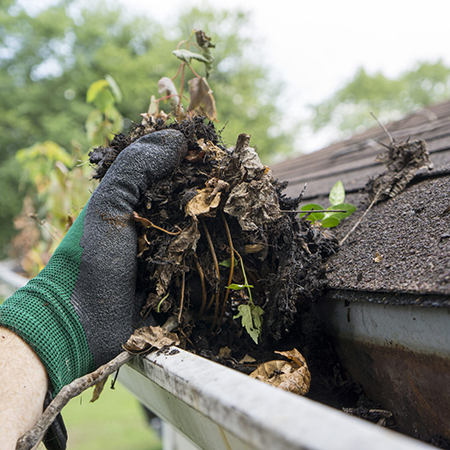How to Deter Birds, Rodents, and Insects from Nesting in Gutters
GUTTERS, GUTTER DAMAGE, GUTTER PEST PREVENTION
If you are a regular blog reader of The Gutter Specialist, you already know that gutters are very important for protecting your home from water damage. But you may not know that under-maintained gutters can become a prime nesting spot for unwanted pests.
Pests are commonly drawn to clogged or poorly maintained gutters, leading to blockages, gutter damage, and even health hazards. Here’s how to identify and implement effective gutter pest prevention strategies.
Common Pests That Invade Gutters
Birds – Birds often build nests in gutters, especially during the spring and summer. Their nesting materials can clog downspouts and lead to water overflow, which can cause gutter damage and affect your home’s foundation and siding as well.
Rodents – Creatures such as squirrels, mice, and rats can use gutters as pathways to your roof and attic. They may also chew through fascia boards or shingles, creating entry points into your home and leading to costly repairs.
Insects – Standing water in clogged gutters provides the perfect breeding ground for insects. Wasps and bees may also build nests in gutters, posing a risk to homeowners. Ants, particularly carpenter ants, are attracted to moisture and can cause structural damage.
Gutter Pest Prevention
Keep Gutters Clean and Well-Maintained
One of the most essential gutter maintenance tips is regular gutter cleaning at least twice a year. If you live in an area with heavy tree coverage, more frequent cleanings may be necessary to prevent gutter damage.
Ensure Proper Drainage
Standing water attracts insects, especially mosquitoes. Ensure your gutters are pitched correctly so that water flows efficiently toward the downspouts. An inspection by a trusted gutter company will indicate whether your gutters are properly pitched. Also, check for clogs regularly and clear them promptly to avoid gutter damage caused by excessive water buildup.
Trim Overhanging Tree Branches
Overhanging branches provide easy access for birds and rodents. It may be prudent to trim back any trees near your roofline to discourage pests from jumping onto your gutters. Removing branches also reduces the amount of leaves and twigs that end up in gutters, improving overall gutter maintenance.
Use Pest Deterrents
The strong scents in essential oils such as citronella, peppermint, or eucalyptus can help deter insects from nesting near gutters. To do this, dilute with water and spray along gutter edges. Reapply regularly for maximum effectiveness.
Seal Entry Points
Rodents and insects often gain access to a home through small openings near gutters. Inspect your roofline, fascia boards, and attic for gaps or holes. You can seal these entry points with caulk, steel wool, or hardware cloth to prevent pests from getting inside and causing further gutter damage.
Consider Gutter Guards
Gutter guards act as a physical barrier that prevents debris from accumulating, while allowing water to flow freely. Professionally-installed gutter guards provide long-term protection by preventing debris buildup. This reduces the risk of clogs, minimizes the need for frequent maintenance, and ultimately extends the lifespan of your gutters.
Monitor for Signs of Infestation
It is also important to regularly inspect your gutters and roofline for signs of pest activity, such as droppings, gnaw marks, or nests. Be sure to address any infestations quickly before they become a bigger problem.
When to Call a Professional
If you notice persistent pest problems despite taking preventive measures, it may be time to call a trusted gutter company to professionally assess the situation and provide safe and effective solutions.
Final Thoughts
Pests in gutters are more than just a nuisance; if left unattended for too long, they can cause serious gutter damage and even pose health risks. By keeping your gutters clean, installing protective measures, and staying vigilant, you can effectively deter birds, rodents, and insects from nesting in your gutters. Regular maintenance and proactive gutter pest prevention will help ensure your gutters remain pest-free and function efficiently year-round.


